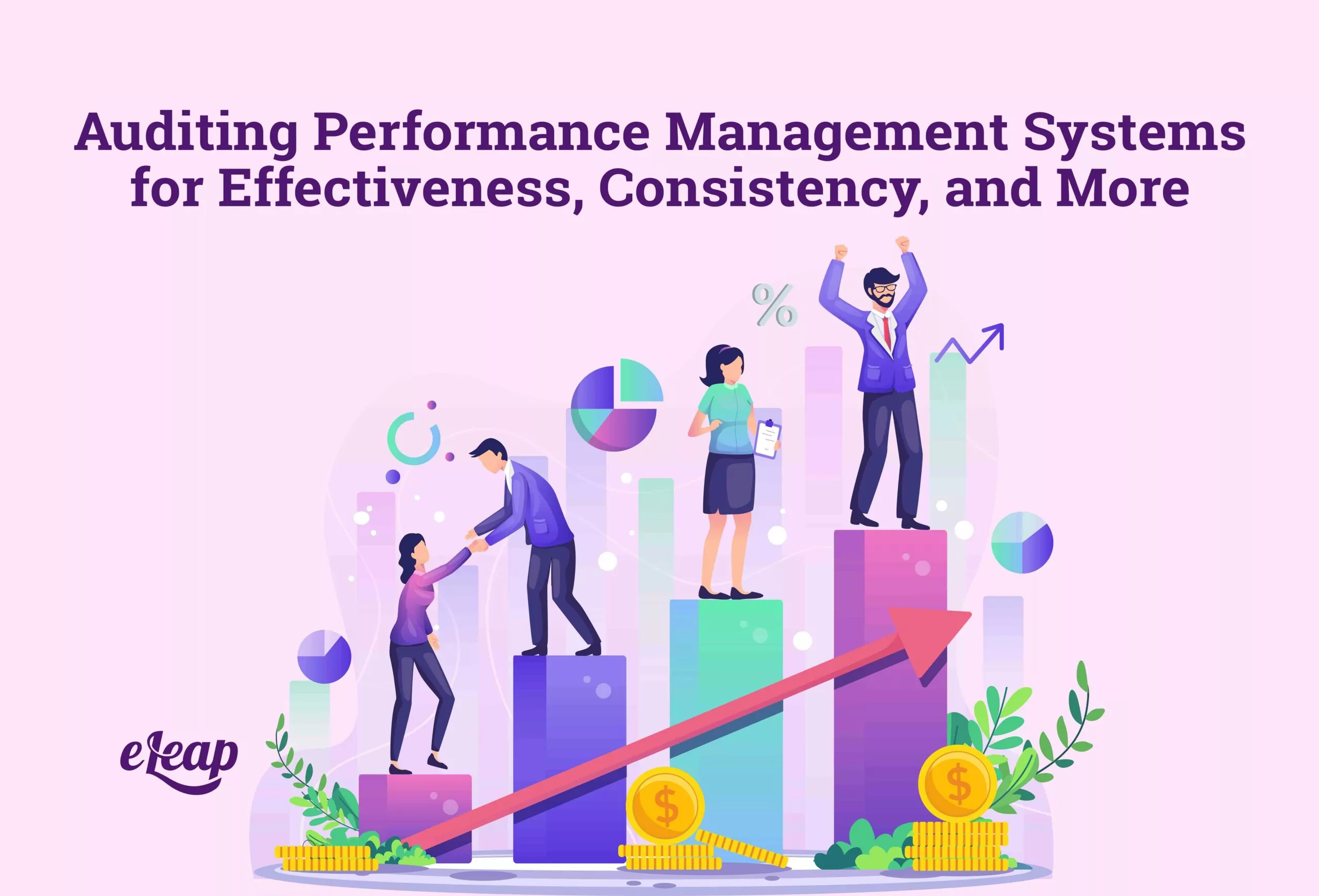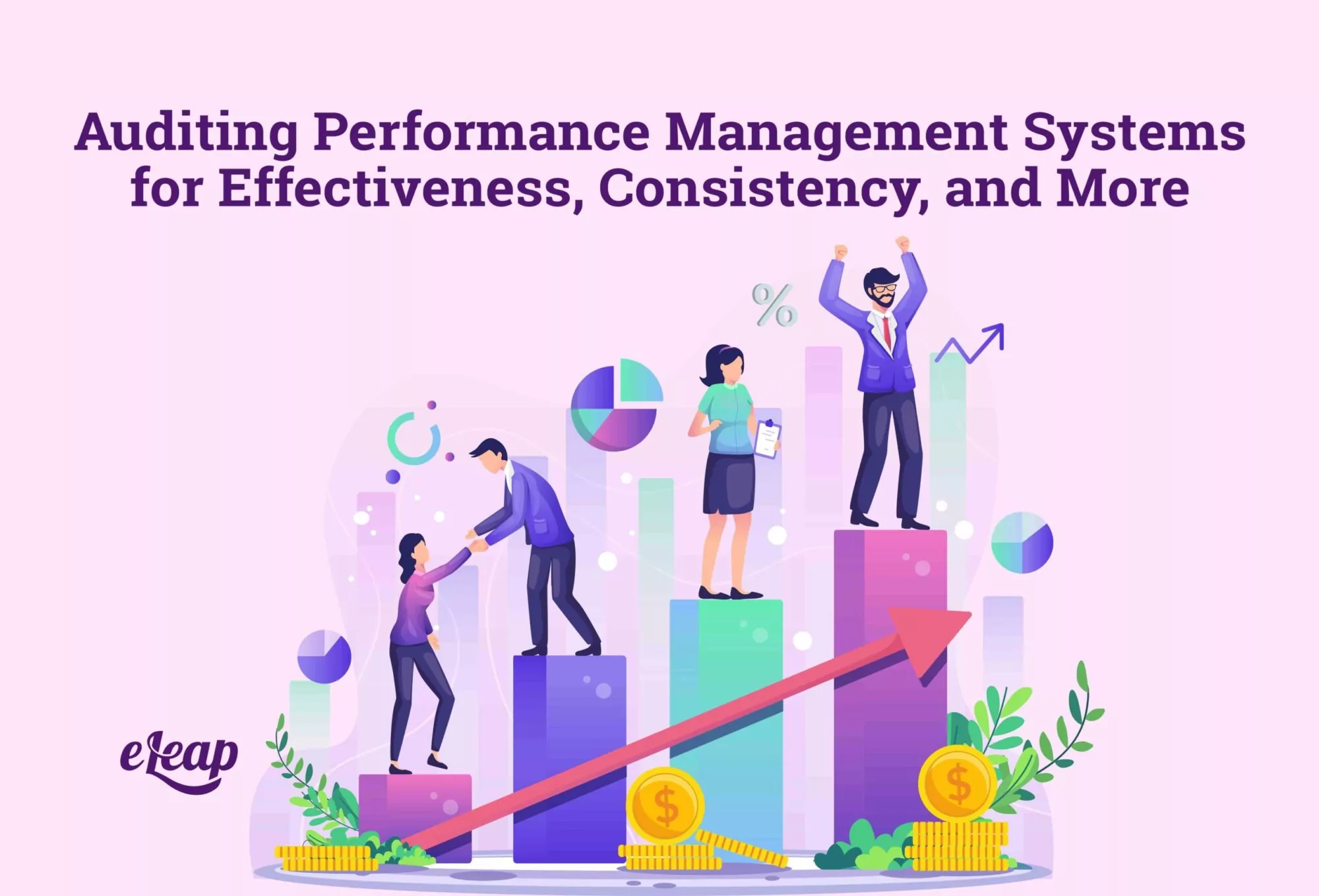Auditing Performance Management Systems for Effectiveness, Consistency, and More

Although organizational leaders might think their performance management system is working well and doing its part to help monitor employee performance and progress, that may not always be the case. After all, it only matters insofar as the employees’ experiences and perceptions of the system and how well it functions. If your employees are not satisfied with the performance management processes that you have in place, it will be difficult to encourage them to utilize them. Explore how eLeaP’s Performance Management Platform can simplify evaluations, boost productivity, and drive measurable results.
Auditing and evaluating the system is one way that you can ensure that the system is being administered fairly and used consistently across all teams, individuals, and the organization as a whole. If there is an adverse impact on any group, there will be concerns about equity and HR must monitor system outcomes to ensure that it is in full support of organizational goals and that it treats employees in a fair, consistent manner.
To implement the best PMS and performance management practices, you first need to identify the issues and how they should best be addressed. The key is that most can be worked into your performance management strategy so that it’s all a part of the process and it delivers the consistency that your employees need.

Common PMS Issues
Although any number of issues could create a gap in the performance management process, some are much more common. There are also issues that need to be resolved quickly to reduce the risk of more serious consequences down the line.
When Performance Management Feels Like Busywork
If people feel like performance improvement and learning initiatives are being fed to them as “busy work,” they are not going to engage as well as they could. Without a clear process and an understanding of how that process contributes to the overall success of the organization, most managers will consider performance management a waste of time or to have little value. This is something that needs to be resolved straight away.
When Top Management Lacks Support
How do you expect employees and supervisors to get behind performance management if top management and executive-level members of the organization don’t view this as an important use of time and resources? Senior management needs to actually participate in the process of learning and development, as well as performance management, to ensure that managers and employees truly understand and appreciate its value.
When Communication of Expectations and Goals Fails
Communication is the leading killer of all performance management initiatives. A lack of clear communication can make it difficult for employees to execute tasks and reach goals. It’s important to have an open discussion about goals and expectations and to provide any clarification needed so that people know what is expected of them. Only then will people truly be able to embrace the PMS and the performance management process itself.
When Performance Ratings are Inconsistent
Different managers are expected to use different methods of rating performance. Some will be tougher, while others will be more lenient, and therefore, people could get completely different ratings for the same performance review, depending on who it’s given by. Interpretation is the big factor here, and HR needs to train managers and leaders to use a consistent rating system and avoid these issues. Organizations that are looking at a top-down rating of the entire workforce will want to create a calibration system that ensures consistency in roles, departments, and even the raters.
Audit for Improvements Across the Board
If you are experiencing any of the problems listed above or are seeing other issues with your PMS, you’ll want to do a full audit of the system, including how it works, what it can and can’t do, and whether there is a better answer for training and development, and so forth. This can give you all the insight that you need to determine how to proceed with your PMS development to ensure that you are delivering a platform that gets results.
Feel free to ask for employee and manager feedback on the performance management process or the PMS platform that you’re using. Consider where people see opportunities for improvement that you might not have noticed because you’re more removed from the day-to-day operations. Organizations need to take the time to develop a solid performance management methodology that includes best practices and an outline for how to manage, rate, and review performance. They also need to ensure that their PMS offers a consistent interaction for every employee and has the full support of everyone in the organization, from upper management all the way down.
You’re Not Reinventing the Wheel
Too often, companies want to throw everything out and throw all their effort into their brand-new PMS and its accompanying performance management strategy. However, that’s often not necessary, not to mention a huge waste of resources. You’re not creating something from scratch here. No one is asking you to develop the best performance management solutions ever seen. You’re just figuring out what works for you. That starts by taking a good look at what you’ve already got in place to see what you can keep, what you can tweak, and what just needs to be replaced with something better.
Consistent, effective management objectives and initiatives will help managers provide a more streamlined, effective performance review process. It will also ensure that employees can interact with the PMS and enjoy the feedback experience as a learning opportunity rather than viewing it as a criticism of some kind.
The issues are similar to those that plague any organization and its goals. However, when it’s related to performance management, it’s going to come with much greater potential consequences, which is why it requires special attention. And remember, auditing isn’t a one-time deal—you’ll want to continue to audit and update your PMS and the strategies that you have used over the years to keep up with current trends and best practices.
Whether you do it yourself or hire someone to help, auditing your PMS and your project management methodologies can help you create a more consistent, cohesive workplace.